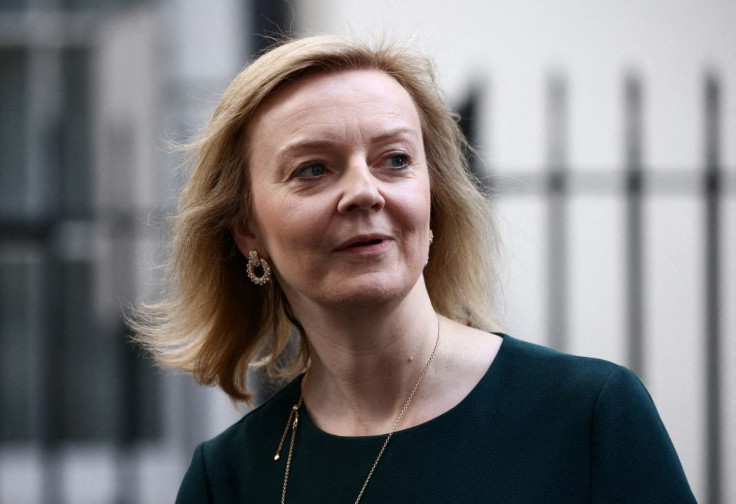Provoking EU, UK Sets Out New Law To Fix Post-Brexit N.Ireland Trade

Britain set out steps on Tuesday to try to break the deadlock with the European Union on trade with Northern Ireland, lining up a new law that would effectively override parts of a Brexit deal and further inflame ties with Brussels.
In a statement to parliament, Foreign Secretary Liz Truss said planned legislation would ease the movement of goods, apply Britain's tax regime in Northern Ireland and hand London more say over the laws governing the province.
She repeatedly told lawmakers the legislation would not break international law and that London would press on with talks with Brussels to try to find a negotiated solution.
But despite EU warnings over taking unilateral action, the new law would change parts of the so-called Northern Ireland protocol, agreed with the bloc as part of the deal over Britain's exit from the EU.
European Commission vice-president Maros Sefcovic said such action was "not acceptable" and that Brussels would respond with all measures at its disposal. Ireland described the move as one "of great concern", while British Prime Minister Boris Johnson said he thought a trade war was unlikely.
Johnson agreed to the protocol in 2019 to allow Britain to leave the EU's single market and customs union without controls being re-imposed on the border between the Irish Republic and Northern Ireland, vital to the 1998 Good Friday peace deal that ended three decades of violence.
By striking such a deal, he effectively agreed to a customs border between Northern Ireland and the rest of the United Kingdom. Britain now says the protocol is unworkable, and months of talks with the EU have failed to find any solutions.
"I am announcing our intention to introduce legislation in the coming weeks to make changes to the protocol," Truss said to jeers from the opposition.
"Our preference remains a negotiated solution with the EU and in parallel with the legislation being introduced, we remain open to further talks."
She said the government would pursue passing the legislation through parliament regardless of how any future talks progressed with the EU but it could be changed if an agreement was reached.
The legislation foresees a "green channel" for goods moving from Britain to Northern Ireland, scrapping rules that prevent the province from benefiting from tax assistance and ending the role of the European Court of Justice as the sole arbiter.
On Monday, Johnson said the government needed an "insurance" option to be able to unilaterally override some post-Brexit trade rules because the protocol, as is, was threatening a hard-won peace in the British-ruled province.
'NOT BEEN PLEASANT'
Stephen Doughty, a foreign policy spokesperson for the opposition Labour Party, agreed there were problems but said Britain needed "calm heads and responsible leadership".
"It is deeply troubling for the foreign secretary to be proposing a bill to apparently break the treaty that the government itself signed just two years ago, that will not resolve issues in Northern Ireland in the long term, and rather it will undermine trust," he said.
The EU has repeatedly said any trade difficulties must be resolved within the parameters of the protocol.
Sefcovic said the British government's announcement that "would disapply constitutive elements of the protocol, raises significant concerns".
"Should the UK decide to move ahead with a bill disapplying constitutive elements of the protocol as announced today by the UK government, the EU will need to respond with all measures at its disposal," he said in a statement.
Ireland's foreign minister, Simon Coveney, said he deeply regretted the decision. "The path chosen is of great concern."
Britain has postponed bringing in many of the checks foreseen by the protocol, which has snarled some foodstuffs in red tape at a time when food and energy prices are rising, fuelling recession concerns.
Before the announcement, Archie Norman, chairman of retailer Marks & Spencer and a former Conservative Party lawmaker, said what the government was proposing seemed to be a "triumph of common sense".
Angela McGowan, the Confederation of British Industry's Northern Ireland Director, called on both sides to show flexibility to secure "peace and prosperity".
"With good political will a landing zone can undoubtedly be found so that GB-NI trade flows are smoothed," she said.
The outcome of regional elections in Northern Ireland increased pressure on Johnson to introduce changes to the protocol after unionists refused to join a new administration unless there were changes to the trading rules.
Jeffrey Donaldson, leader of the largest pro-British grouping the Democratic Unionist Party, welcomed Truss's commitment to action but he reserved judgment on whether his party would as yet return to the power-sharing administration.
"We hope to see progress on a bill in order to deal with these matters in days and weeks, not months," Donaldson told parliament. "We want to see the Irish Sea border removed."
© Copyright Thomson Reuters {{Year}}. All rights reserved.





















